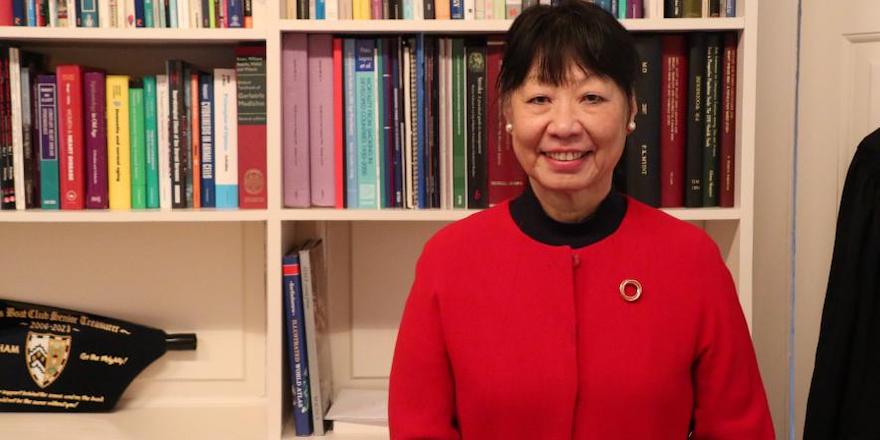University of Cambridge Academics Ranked Among Best in the World
Twelve academics from the University of Cambridge have been ranked among the top female scientists in the world - with one claiming the top spot for Europe.

The Research.com Best Female Scientists in the World 2023 rankings are based on an analysis of more than 166,000 profiles of scientists across the globe. Position in the ranking is according to a scientist’s total ‘H-index’ — rate of the publications made within a given area of research as well as awards and recognitions. Only the top 1,000 scholars with the highest H-index are featured in the ranking.
Discover the three University of Cambridge scientists who cracked the top 10
Kay-Tee Khaw, an Emeritus Professor in Gerontology and a Gonville & Caius Fellow, is placed fifth worldwide and tops the list for Europe. Professor Khaw, who was named a CBE in 2003 for Services to Medicine, published a study on how modest differences in lifestyle are associated with better life expectancy which informed the UK Government’s ‘Small changes, big difference’ campaign in 2006.
Also high in the rankings is Barbara Sahakian, Professor of Clinical Neuropsychology in the Department of Psychiatry and a Fellow of Clare Hall, who is placed sixth in the UK. Professor Sahakian’s recent research includes a study showing the benefits to mental health and cognitive performance of reading for pleasure at an early age, and seven healthy lifestyle factors that reduce the risk of depression.
Joining Professor Khaw and Professor Sahakian in the top 10 in the UK is Carol Brayne, Professor of Public Health Medicine in the Department of Psychiatry and Fellow of Darwin. Awarded a CBE in 2017 for Services to Public Health Medicine, Professor Brayne has pioneered the study of dementia in populations.
Meet the other nine University of Cambridge scientists
Nine other University of Cambridge scientists also make the rankings:
- Professor Gillian Murphy (Department of Oncology), an international leader in the field of metalloproteinases, who has defined their roles in arthritis and cancer.
- Professor Claudia Langenberg (MRC Epidemiology Unit), a public health specialist combining her expertise with research focused on molecular epidemiology.
- Professor Nita Forouhi (MRC Epidemiology Unit), a physician scientist, MRC Investigator and Programme Leader in Nutritional Epidemiology, whose research on the link between diet, nutrition and chronic diseases like type 2 diabetes has informed health policy.
- Professor Alison Dunning (Centre for Cancer Genetic Epidemiology, Department of Oncology), a genetic epidemiologist working on the risk of breast and other hormonal cancers.
- Professor Karalyn Patterson (MRC Cognition and Brain Sciences Unit, Cambridge Centre for Frontotemporal Dementia and Related Disorders), a Fellow of Darwin College, who specialises in what we can learn about the organisation and neural representation of language and memory from the study of neurological patients suffering from the onset of brain disease or damage in adulthood.
- Professor Dame Clare Grey (Department of Chemistry), a materials chemist whose work has paved the way for less expensive, longer-lasting batteries and helped improve storage systems for renewable energy, she is Chief Scientist and co-founder of Nyobolt, a company that is developing ultrafast-charging batteries for electric vehicles.
- Professor Sharon Peacock (Department of Medicine), who has built her scientific expertise around pathogen genomics, antimicrobial resistance, and a range of tropical diseases, was the founding director of the COVID-19 Genomics UK Consortium which informed the COVID-19 pandemic response.
- Professor Maria Grazia Spillantini (Department of Clinical Neurosciences and Fellow of Clare Hall) has been researching the cause of dementia for many years and was the first to identify the specific protein deposit found in Parkinson’s disease.
- Professor Dame Theresa Marteau (Department of Public Health and Primary Care and Honorary Fellow of Christ’s College), a behavioural scientist, focuses on the development and evaluation of interventions to change behaviour (principally food, tobacco and alcohol consumption) to improve population health and reduce health inequalities, with a particular focus on targeting non-conscious processes.
Speaking on publication of this year’s rankings, Imed Bouchrika, Co-Founder of Research.com and Chief Data Scientist, said: “The purpose of this online ranking of the world's leading female scientists is to recognize the efforts of every female scientist who has made the courageous decision to pursue opportunities despite barriers.
“Their unwavering determination in the face of difficulties serves as a source of motivation for all young women and girls who pursue careers in science.”
Learn more about the University of Cambridge
account_balanceMore About This School